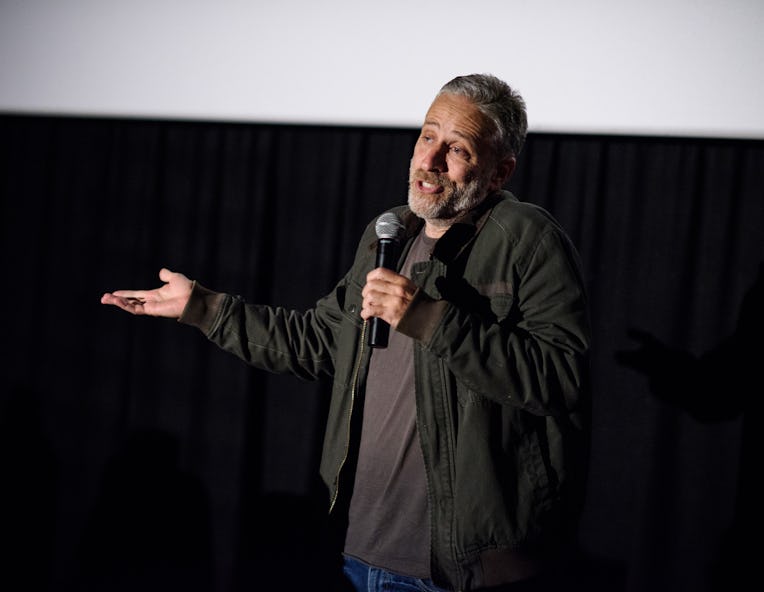Jon Stewart to Big Oil: You Are Valid
Stewart himself has become an old rock we're over-relying on

Because no one is tuning into The Problem with Jon Stewart when it drops on Apple TV+, I only just learned about last week's episode on climate change, where he took the brave stance of… siding with fossil fuel companies?
I will forgive you for not watching that whole thing, it is seven minutes long and will only make you regret ever thinking that you and Stewart might be on the same team. The thesis of the whole thing can be summed up by Stewart asking the question, “100 of these [fossil fuel] companies make 70 percent of our global emissions. Wouldn’t it be better to hold our noses, to not villainize them, to understand that no industry is ever going to cut its own throat and take away its profits?” I’m not a scientist, but I think the answer is no, it would not be better.
He then turns to Katherine Dixon, a former VP of Strategy for Energy Transition at Shell, and asks, “If you had to sit down with a guy from Shell and ask them a question, or get them on board, what would you say?” Wasn’t that her whole entire job at one point? Can’t she just text Jim from Shell and ask him? Dixon answers in earnest, agreeing that being “combative” with fossil fuel companies is never going to work, and that we need to focus on “cooperation.” Spoken like a true Shell executive.
What you only get in small pieces from this clip is that even in its attempts to be funny, the show falls flat (How many times can one man joke about being from New Jersey?). If you did watch all seven minutes — first of all, congratulations — you will note that the biggest laughs come from panelist Heather Toney, VP of Community Engagements at the Environmental Defense fund. In between segments with the panel, there is a short video where Stewart voices a polar bear who wants humans dead and makes a joke about eating ass.
The show opens with footage from the producers meeting, which finds Stewart and his team in a conversation that feels like it’s from one of the West Wing episodes that Aaron Sorkin didn’t write. “In 40 years, we’ve only recycled about 10 percent of the plastic we use,” says one writer, “So if seatbelts only worked 10 percent of the time, they wouldn’t fucking work. But what it does, it makes us feel good.”
“Dopamine,” Stewart says, crossing his arms and leaning back in his chair. Martin Sheen he is not, but he sure is trying.
There is also an entire segment from Ed Begley Jr. making a joke about how his famously eco-conscious way of life is a miserable way to live. This is the kind of groundbreaking content that earned Stewart a Peabody Award.
Stewart ends the show with an interview with Ben ven Beurden, the CEO of Shell, who gets about 10 minutes to hit all of his talking points with little pushback. The one moment of tension comes when ven Beurden says that he does not agree with everything the American Petroleum Institute does, to which Stewart asks, “Aren’t you on the board?” The camera lingers on our host, suppressing a smug little smile. This, I think, is supposed to let the viewers know that Stewart thinks ven Beurden is a hypocrite.
That kind of zinger is partly what made Stewart famous to begin with. The difference being that he used to have follow-up questions, or at the very least a desire to prove to his audience that the person he was talking to was a disingenuous asshole. Consider the difference between his interview with ven Beurden and his famous appearance on Crossfire in 2004. Stewart appeared on the CNN show with the explicit goal of telling Tucker Carlson to his face that he was a hack who was actively harmful to the fabric of the country. Now he has the CEO of one of the biggest fossil fuel companies in the world in front of him, and all he can offer is a self-satisfied smirk.
If you are not watching The Problem with Jon Stewart, it is best you keep it that way. What you’ll find is a diminished version of Stewart, one who is perhaps too tired to probe the absurdity of power and satisfied to just say, “You all get it, right? Ok, moving on.”